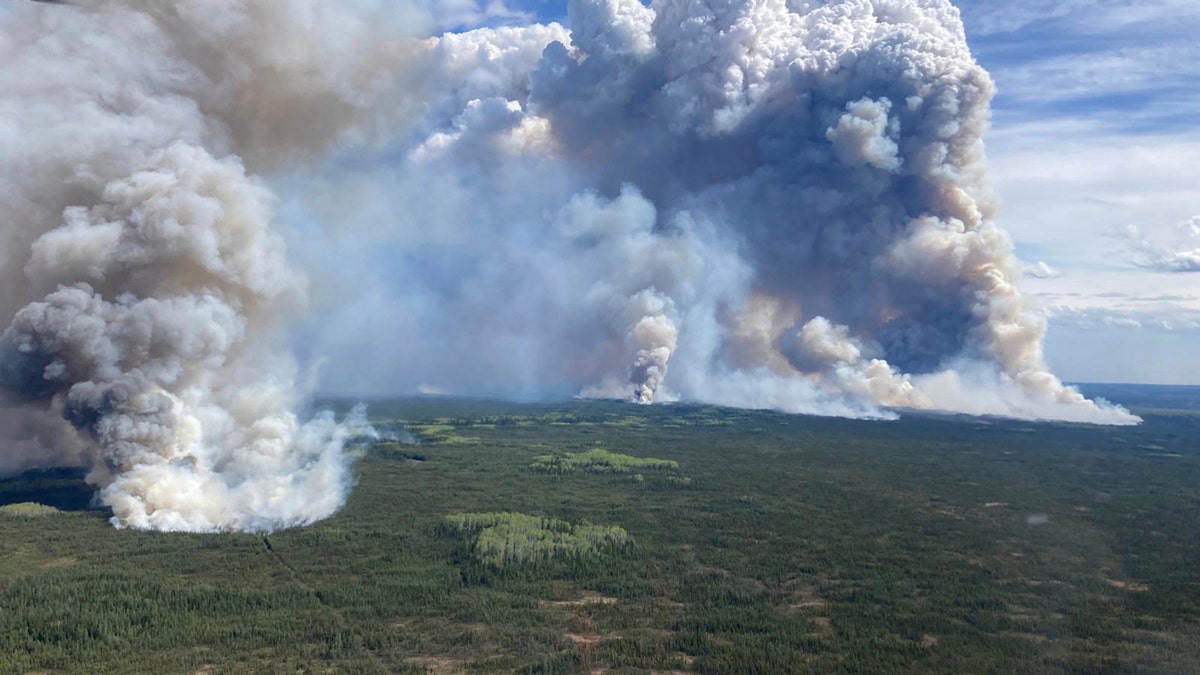Hundreds of residents in four neighborhoods in the southern end of Canada's oilsands hub Fort McMurray, Alberta, have been ordered to evacuate due to a wildfire threatening the community, officials said. authorities announced on Tuesday.
The Rural Municipality of Wood Buffalo said residents of Beacon Hill, Abasand, Prairie Creek and Grayling Terrace must leave by 4 p.m.
CANADA FIGHTS WORST WILDFIRES SEASON IN HISTORY, AS NORTH AMERICA IS ENGLISHED IN SMOKE
An emergency evacuation warning remained in effect for the remainder of Fort McMurray and surrounding areas.
The rural municipality said residents in the four neighborhoods were ordered to clear space so crews could fight the fire, which had spread within 13 kilometers of the town.
Fort McMurray has about 68,000 residents and a 2016 wildfire destroyed 2,400 homes and forced more than 80,000 people to flee.
“It is very important to me to know that these fires are very different from the Horse River wildfire of 2016. We have an abundance of resources and are well positioned to respond to this situation,” said Chief regional firefighters, Jody Butz.

This photo provided by the BC Wildfire Service shows a view of the Parker Lake wildfire near Fort Nelson, British Columbia, Monday, May 13, 2024. (BC Wildfire Service/The Canadian Press via AP)
Suzy Gerendi, who runs the Beacon Hill neighborhood dessert shop, said she had already packed her bags when the evacuation order was issued. Gerendi was living in Beacon Hill when a fire broke out there in 2016.
She immediately set off on the road to Edmonton, Alberta, with her three dogs.
“It’s very, very dark and orange,” Gerendi said. “It brings back memories and it’s not a good feeling.”
Residents also faced heavy smoke and ash.
“It's dark. The smoke is everywhere,” said resident Else Hoko.
Hoko went to pick up her two sons from Abasand school after receiving the evacuation order. She also fled in 2016.
“I’m so stressed,” she said, adding that she was praying for rain.
The Beacon Hill and Abasand neighborhoods saw heavy losses in 2016.
The current fire has grown to approximately 110 square kilometers (42.5 square miles) and remains out of control.
Josée St. Onge, Alberta wildfire information officer, said the wind was pushing the fire toward the community.
She said crews had been pulled out of the fire line for safety reasons and air tankers and helicopters continued to drop water and retardants on the “active edges.”
“Unfortunately the winds are not favorable for us and the fire will continue to advance towards the city until we see a change in the wind,” she said.
In the northeast of the neighboring province of British Columbia, areas under mandatory evacuation have multiplied, with the latest order Monday for the Doig River First Nation and the Peace River Regional District as a fire threatened nearby.
Tuesday's forecast called for winds likely to blow a growing wildfire closer to Fort Nelson. Rescue workers called most of the 50 residents still in the town and urged them to leave.
The British Columbia Forest Fire Service said the fire had grown to 84 square kilometers (32 miles). As of Monday, its area was about 53 square kilometers (21 miles). A photo from the department shows the fire spreading through a large wooded area.
The community of about 4,700 residents and neighboring Fort Nelson First Nation have been under an evacuation order since Friday.
Northern Rockies Regional Municipality Mayor Rob Fraser said one of the downsides of evacuation is how difficult it is for essential personnel, including firefighters, to find food.
“It's really going to depend on the weather, and so far the weather has held up,” Fraser said of the wildfire in a video posted to Facebook.
CLICK HERE TO GET THE FOX NEWS APP
In 2023, Canada experienced a record number of wildfires that brought choking smoke to parts of the United States and forced more than 235,000 Canadians to evacuate their communities. At least four firefighters died.
Several forest fires are burning in western Canada.
